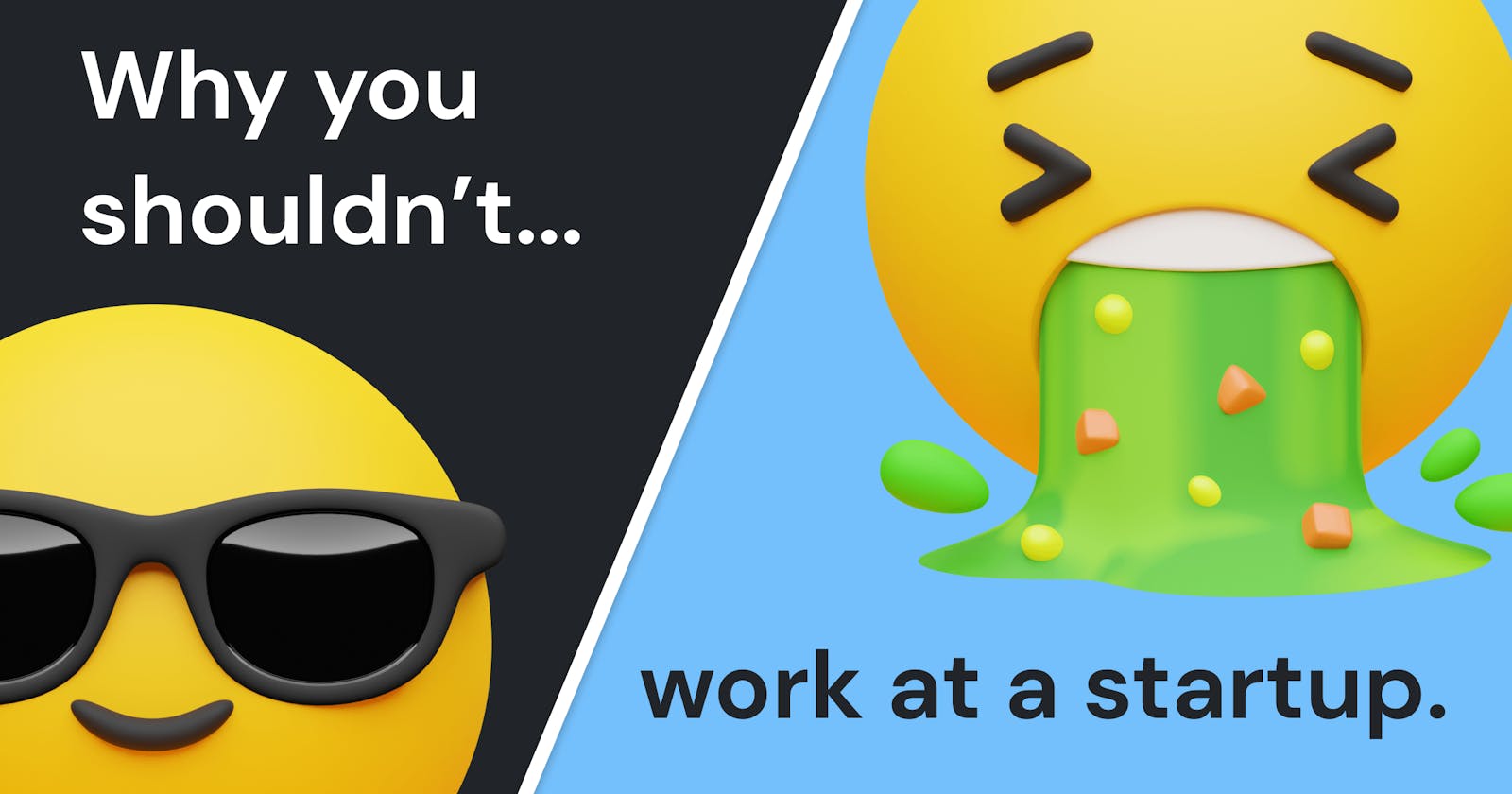Why you shouldn't work at a startup
And why I love working at startups anyways
I've worked at 7 startups (4 funded, 3 bootstrapped) over 12 years and I've never been at one that didn't at least partially burn me out and tax my emotional and mental health.
The main issue is that at a startup, you're not focused on solving internal problems with your team — you're mostly focused on solving problems for customers. This can be incredibly rewarding because you're making a real difference, but it also means your day-to-day working relationships might deteriorate without active maintenance.
Also, because you're always stretched thin trying to manage customer feedback, define your role, and figure out your next project, you don't see big changes coming and if they affect you, they can give you severe mental and emotional whiplash.
What is freedom?
The main reason to work at a startup is the incredible amount of freedom you'll experience. No one will guide you and tell you exactly what to do, your role will gradually become less and less well-defined, and you'll pretty much be able to do whatever you want until you make a big mistake.
What they don't tell you about freedom is: it's terrifying.
While it might mean no one is telling you what to do, it also means you have no idea what to do and you need to figure it out on your own. If the situations you encounter are complicated enough, it can feel impossible to break through into clarity.
Meaning you end up feeling like you're spinning out of control — and no one cares.
Anti-bullshit Machine
Startups are amazing at carving away bullshit and leaving you with just what matters.
Released a new feature but still have no customers? That feature was bullshit.
Had a great conversation with your cofounder but still have no customers? That conversation was bullshit.
Startups put you in touch with direct feedback from the market, customers, and the problems they want you to solve. If you solve them, you may or may not get rewarded. Even if you find the right market, you may or may not get rewarded.
It's a really risky but exciting game: you have to be willing to put everything you have into your job with uncertain results. Everything depends on your team's competence and you have to rely on your team.
Everything is at stake
What happens if you fail at a big company? You might not get a raise or maybe your boss with take the brunt of the responsibility.
But at a startup: if you fail enough times, your company will fail.
If you're getting no customers, you're team will be demoralized, your funding will run out, and you'll be forced to throw a Hail Mary pass to find something that works — even if it seems impossible — or the people will start leaving and your company will fail.
And because everyone is trying their hardest trying to achieve product-market fit, there's no time to prepare for unexpected surprises.
If something big comes along — like your biggest potential customer decides not to sign the contract — you have no spare cycles to be able to address this emergency. And turning the entire company to a new mission or direction can be overwhelmingly taxing.
Whiplash Story #1: Big Company Goes Nom-Nom
Every startup wants to sign a big, enterprise customer and make enough money to support themselves for months. But these customers are always tricky — they want more than you can currently offer and if you over-promise, your Product team will be driven bonkers trying to keep up with the impossible pace of development you've set for them.
I worked at a startup that took on a big customer. They came in slowly — first with a few calls and small feature requests — but then started requesting bigger features. Before long, they wanted their own private portal with custom features defined by their Product team and advanced administrator controls.
At first we thought we could pay for a whole year of our startup's existence with the money from this customer, while only working for 6 months. But it turned out the more features we built, the more they wanted. And they could always cancel the contract if if things weren't working out, so we had to do whatever they said.
In the end, they ended up funding a year of our startup, but requested 1.5 years of custom work. And we couldn't reuse these custom features with other customers because they were so specific to this particular customer.
Whiplash Story #2: Magical Demo, Terrible Product
You've heard about founders who are so inspiring that it's hard to turn away from them when they're talking. They're describing problems you have and connecting them to a magical version of reality that they're building. It's hard not to cheer for them. Part of you wants the world to change drastically and here's someone who's actually doing it — putting in the work to make their vision a reality.
Every founder needs this kind of reality-distortion field. It's how they communicate their dreams and get a team behind them who believes in this reality enough to build it.
But reality and the dream very rarely match up. It's much easier to promise something than to build it.
I once interviewed at a company that showed me a working demo of a product that was incredibly cool. It did things I didn't think were possible in a simple and elegant way. I had no doubts that this company was going places and I was just excited they wanted me to come along.
It turns out that the product demo they gave me used fake data and fake interactions and didn't actually exist as described. When I logged in to their system, everything looked the same and appeared like it worked, but there were so many bugs and missing pieces that it wasn't even close to what they'd promised.
I only realized how badly they had lied to me after a year of working there. And by that time I was so deep into working on and fixing the product, it was hard to consider how much of a betrayal that had been. I felt stupid.
The worst part is their Sales team did the same thing to their customers — promising a product that just did not exist. After the customer signed up, they'd do everything to keep them paying, and make them feel like the product not working was their fault.
It was a terrible experience and I feel really bad for having worked at a place like that.
Conclusion
TLDR: Work at a startup if you want your boundaries and motivation to be tested against real-world experience. If you think you have what it takes to bring a product people love to market, then go for it! Your efforts will be rewarded tremendously with customers who love you and equity that's actually worth a lot.
Tips:
- Be careful about joining a startup before it has at least 5-10 customers. These are unvalidated ideas and these companies might be led by founders who think their ideas are more important than what their potential customers actually need.
- Respect your own boundaries because no one will do it for you. If you need to take a walk or a vacation, advocate for yourself. Do not get sucked into the endless rabbit hold of "just one more thing". Before you know it, you'll have lost yourself and your connection to your own natural motivation.
Just to be super clear: startups aren't that bad! 😄
I've only worked at startups my entire career and for all the criticism I have of them, I thoroughly enjoy them too!
There's nothing like the experience of defining and being responsible for your own work! If that sounds like your jam, startups are amazing.

